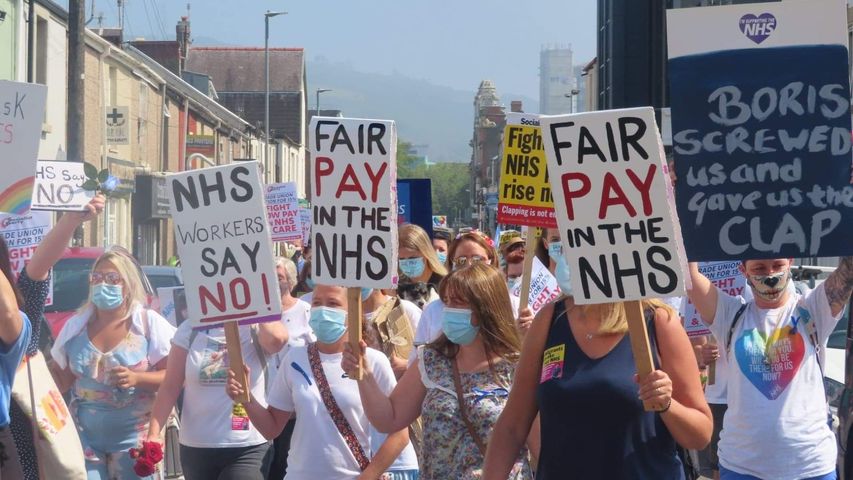

The government has recommended a 1% pay rise for NHS workers in England, accurately described by the British Medical Association (BMA) as a “kick in the teeth”. The Royal College of Nurses (RCN) has set up a £35million strike fund in response.
NHS workers have been on the frontline of the pandemic for more than a year. Over 850 health and social care staff have been killed by the virus. A further 122,000 are suffering from long Covid, a debilitating and potentially life-changing illness.
After calling key workers heroes and encouraging the public to clap for them, the paltry pay offer has prompted fury. The NHS had been budgeted a 2.1% raise but the government revised this figure down, citing the pressures of pandemic spending.
However, the cost of Covid has not prevented the government committing over £16bn to increase military spending, the largest increase since the Second World War. It must also be remembered that £37bn of the pandemic spending was wasted on the privatised Test and Trace scheme which, according to a cross-party investigation: “cannot point to a measurable difference to the progress of the pandemic”. It is clear the government’s refusal to offer more than the insulting 1% to NHS staff is not a matter of “can’t” but “won’t”.
For an experienced nurse, the proposal would amount to an additional £3.50 per week. The government has argued that this is a real-term pay increase. However, NHS staff have seen their real-term wages shrink by up to 19 per cent since 2010 and the spiralling cost of living means this pay rise is another pay cut.
The union response
The RCN leader said of the pay offer: “Nursing staff would feel they are being punished and made to pay for the cost of the pandemic. It is a political decision to underfund and undervalue nursing staff… the government can expect a backlash from a million NHS workers. Taxpayers are supportive of a significant and fair pay rise for NHS workers – this year of all years.”
Members of Unite the Union, who organise over 100,000 NHS workers, have been campaigning since the autumn for a 15% pay rise, a justified figure given the attacks on wages since 2010. Meanwhile, RCN is calling for 12.5% and Unison wants a minimum of £2000 for each worker. The GMB union has now taken up the call for 15% and members of the RCN, Unison and BMA should demand their leaderships do the same.
Both Unite and the RCN, together representing 450,000 nurses, are considering industrial action. Unison could follow suit after acknowledging a 1% pay award will “cause widespread industrial upset”.
Action must be taken soon to have the greatest impact. The government’s recommendation of 1% has been submitted to the “independent” pay review body, which will make its own recommendation. The government is then expected to announce a decision in June, two months after NHS staff were due to receive their 2021/22 pay rise.
How to win
A series of protests organised by Unite over the autumn brought the issue of NHS pay into sharp relief. But when other unions failed to join the campaign and a further lockdown was announced the campaign died down.
Now, Unite members and their supporters up and down the country are reviving the fight for 15%. A socially-distanced protest of 40 people in Manchester on 7th March ended with nurse Karen Reissmann being arrested and fined £10,000 in a disturbing attack on a legal demonstration.
However, even with popular opinion against them, the government is unlikely to back down on NHS pay without serious industrial action backed by popular support. Any concession to health workers would open the door to demands for pay rises from million of public sector workers who are facing a pay freeze from April.
The NHS Unions should organise workplace protests outside hospitals across the country. Regular protests (for example every Thursday) could build towards much-needed industrial action by bringing together members of the many NHS unions in a joint campaign, building confidence and union membership, and setting up democratically elected strike committees to ensure the different unions stay united and that workers when to strike and for how long.
This is crucial, as the last strikes were demobilised and sold out by the Unison and RCN leaderships who deliberately misrepresented a government pay offer to their members, meaning many nurses received far less than they thought they were agreeing to.
Industrial action will certainly be attacked by the government and media who will use extensive legal powers and blackmail to bully healthworkers into accepting poverty pay. But if the wider labour movement builds solidarity action through local councils of action, rank and file workers and young people can bypass the trade union bureaucracy’s inertia and paralysing fear of demonstrating practical solidarity.
In this way the healthworkers who have been at the forefront of protecting us from the pandemic, can open the way for all the trade unions to bring forward pay claims at the same time. That is the way to beat this government.